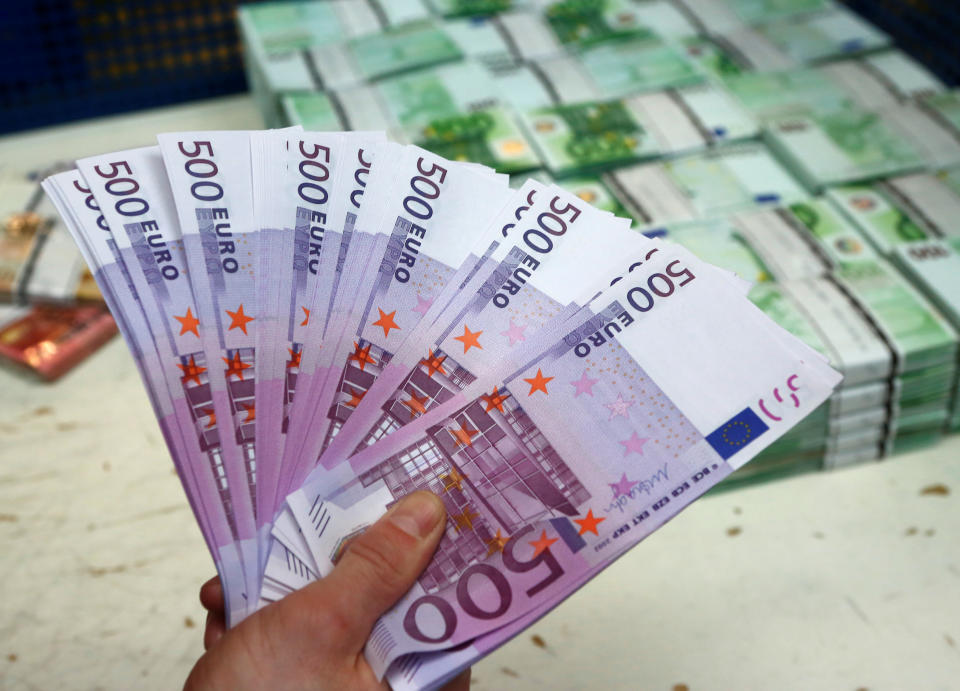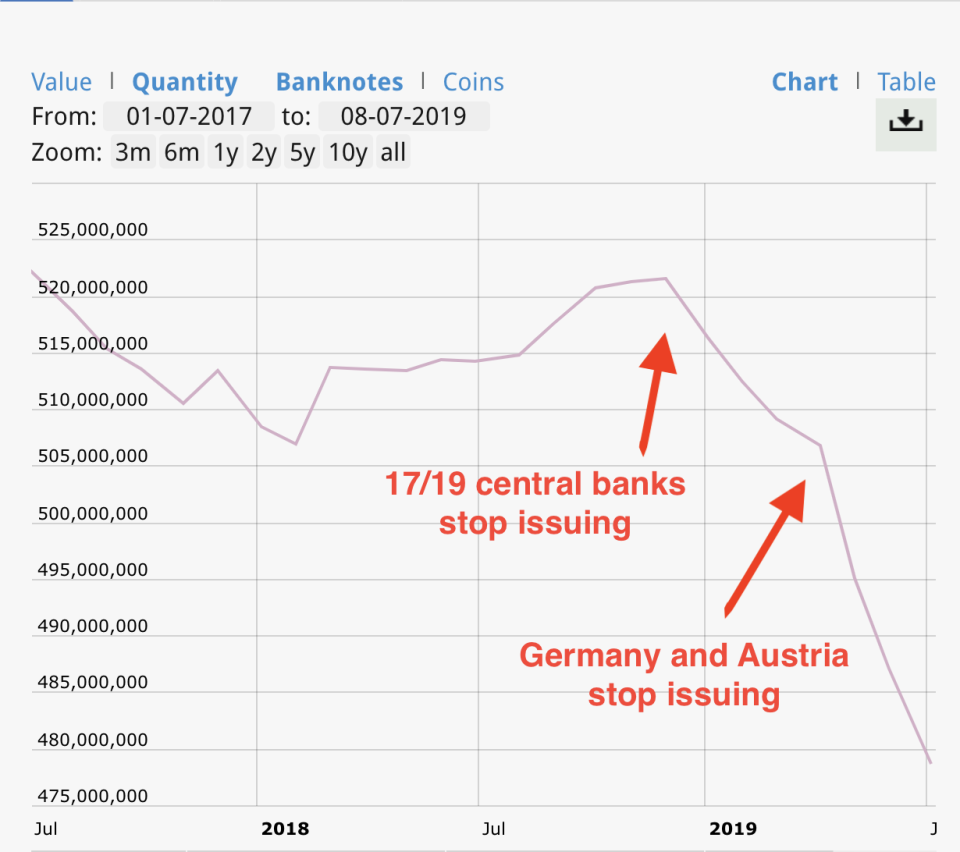The 500 euro-note phaseout could have an unintended consequence

BERLIN - Cash still rules in Germany, both in bank accounts and in wallets. But a confluence of negative interest rates and the phasing out of the 500-euro banknote could throw a wrench into the banking system.
With the German economy close to recession and government bond yield curves going negative, it’s possible that bank deposits may end up paying negative interest.
In other words, banks may charge you to park your cash there. In fact, this has already begun to happen. In Switzerland, UBS announced it would charge 0.75% in interest for deposits over 2 million Swiss francs, or $2.03 million.
A few politicians have made noise about banning the practice if it were to happen in Germany. But Germany's financial markets watchdog BaFin strongly advises against this practice, a good sign for banks.
If it were to happen, it would be tricky for people in this cash-loving country. Paying for deposits makes people hold onto more cash, but an added wrinkle is that the biggest and most useful bills when it comes to store of value are disappearing. The ECB announced it would discontinue the 500-euro bill, sometimes nicknamed the “Bin Laden” (“Everyone’s heard about it, but no one has actually seen it,” the saying goes), in 2016, citing concerns that it “could facilitate illegal activities.”
Germany really loves cash
Germans have a very high savings rate – about 10% of income, according to Deustche Bank. “Cash and deposits are the biggest chunk of German households’ financial assets: they made up 42% of the total in Q2 2018, a more or less stable figure since 2008,” according to Deutsche Bank research.
If Germans had to pay interest on cash deposits, they’d probably be compelled to withdraw their money in masses. According to the ECB, around a third of banknotes in Europe are used as stores of value, and it’s very much the case of Germany, a country that has long had a complicated relationship with money, with memories of outrageous hyperinflation in the Weimar Republic. The post-war changeover from the Reichsmark to the Deutschmark in 1948 dealt another blow to Germans since with an unfavorable exchange rate (10 to 1).
Already, there is a portion of the population that keeps money under the mattress. In 2016, an ECB survey found that 24% of respondents said they had saved cash outside a bank account as a precautionary reserve, though the survey noted that the numbers could have been compromised by people not wanting to even tell an anonymous survey they keep cash.
If negative deposits do come, savers will have a much more difficult time dealing with the cash. After long discussions, the 500-euro banknote started to get phased out in January everywhere but Germany and Austria, because of the countries’ attachment to the big bills. But in April, they stopped as well, and the number of 500-euro notes in circulation dropped.

“Negative interest rates encourages storing cash,” said Torsten Sløk, chief economist at Deutsche Bank, in an email. “And the discontinuation of the 500-euro note has made it more expensive to store big amounts of cash.”
This is mostly for large entities that might benefit from fewer paper bills for transport, storage, and counting or bills, but the changes affect anyone looking to store money in cash. The 200-euro note, the next largest, is still being printed, but is the least-common note; however, it’s tied now with the 500-euro note for its level of scarcity.
On the other hand, Kenneth Rogoff, a professor at Harvard who has long led the charge against these large bills for their role in criminal activities, told Yahoo Finance that it shouldn’t be a big deal. Rogoff said his research showed that most Germans only have a couple hundred euros at a time, and that from all the legitimate euro usage — rather than cash for crime or other shadiness.
“Of course, negative interest rates increase demand for cash, but it is still expensive and risky to hoard large amounts,” said Rogoff.
In Switzerland, which has at least one bank with a -0.75% interest rate, cash is easier to store, as the country has a CHF 1,000 ($1,012) bill. The bill has always been popular as 40% of Swiss people had a CHF 1,000 bill in the past two years, according to the Swiss National Bank. In Switzerland, cash is kept as storage of value by 37% of households.
As of yet, there haven’t been any negative interest rates for savings accounts in Germany – which could be why there hasn’t yet been any real rush to get a hold of these disappearing 500-euro notes, according to German banks contacted by Yahoo Finance.
“Even when Deutsche Bundesbank announced they wouldn't produce the 500 euro banknotes any more, our clients didn't demand them more than before,” said Julia Droege-Knaup of Frankfurter Sparkasse. “Used 500 euro banknotes may still be available in our central office... in Frankfurt, if other clients handed them in before. Our ATMs don't contain these notes anymore.”
Sometimes clients getting huge amounts of cash ask for bigger notes, Droege-Knaup added, but overall, “most clients absolutely accept the fact that it's harder to receive them now and use 200 euro banknotes instead.”
--
Ethan Wolff-Mann is a writer at Yahoo Finance focusing on consumer issues, personal finance, retail, airlines, and more. He is on a two-month reporting fellowship in Berlin. Follow him on Twitter @ewolffmann.
Americans are trying to invest in Denmark’s negative mortgages
Tech companies are trying to disrupt banks, and banks are ready
‘Flight shame’: A potential headwind for airlines in Europe
Apple Card might finally get people to use Apple Pay
Read the latest financial and business news from Yahoo Finance
Follow Yahoo Finance on Twitter, Facebook, Instagram, Flipboard, LinkedIn, YouTube, and reddit.


